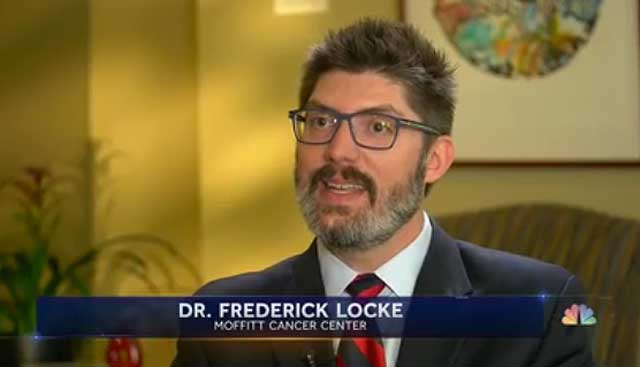
Dr. Locke: CAR-T Cell Therapy a 'Revolution in Cancer Care'
"I was losing my battle against cancer," Dimas Padilla, a patient at Moffitt Cancer Center, told NBC News.
Padilla has been battling diffuse large b cell lymphoma, a form of non-Hodgkin lymphoma, since 2011. He initially received chemotherapy and went into remission for a year. When the cancer came back again, he had to have a bone marrow transplant. He enjoyed a two-year remission, but the cancer came back once again. Chemo did not work and a donor could not be found for another bone marrow transplant. That is when Padilla was introduced to Dr. Frederick Locke at Moffitt.
Dr. Locke is the principal investigator for a new experimental immunotherapy called CAR T-cell therapy. The treatment involves collecting some of a patient’s immune cells (T-cells), genetically engineering those cells to fight cancer, and infusing them back into the patient's body.
"Your body has many different soldiers within it that could fight a ground war or a sea war or a land war. We're taking all those soldiers out, giving each one of them a GPS and telling them … your target, what you're supposed to go attack, is actually the lymphoma," he said. "We're actually taking the cells out of the patient; redirecting them and putting them back in."
Although Padilla says he experienced many side effects with the treatment, he's extremely thankful he's now in remission.
He's part of the 80 percent of the 101 patients who received CAR-T who are still in remission six months later.
Kite Pharma, the company developing the treatment, received Breakthrough Therapy status from the FDA in late 2015. This status allows for accelerated approval of a new therapy. Late last month, Kite began filing its application for approval with the Food and Drug Administration. The FDA is expected to make a decision on its approval by the end of 2017.
Dr. Locke cautions it's still too early to determine if any of the patients were cured but the therapy is a positive alternative for patients without any other treatment options.
"This is a revolution. It's a revolution in cancer care. This is the tip of the iceberg," he said.
See more of Dr. Locke's interview on NBC News and CBS News reports.
